
Amazon requested, nay demanded that we remove all the links to their products. Only too happy to comply! Only, it takes time. As a friend remarked, |"the site is enormous."
So please just don't click on those links (not that many people did); go straight to Amazon. Thank you.

Writers whose books I always pick up when I have a chance; and books that have to do with this site.
No doubt more will find their way here. There are more, by category at page bottom.
First, for a change, some good news! It seems (New York Times 2004-11-22) computer programs like Brutus.1 are starting to appear, that can write >novels. No doubt complete, unabridged and especially unexpurgated. Some people, as always, are really worried by this; I merely think, what a relief! now is the time for people like Hailey or Crichton to lay their keyboards down and get an honest job.
If they are not $6,000,000 Men already. (Was that the correct amount? My, such inflation.)
As long as they tell you the author is U.2. Brutus...

Ed McBain
Erasmus of Rotterdam
C.S. Forester
Ernest K. Gann
Jan de Hartog
Erich Kästner
Akira Kurosawa
Yayoi Kusama
George Orwell
Robert Louis Stevenson
Mark Twain
P.G. Wodehouse

 |
 |
 |
 |
 |
 |

download free books


all you cheapo deal-seekers, try them out!
ED McBAIN
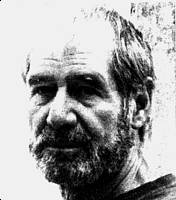
The 1959 book Akira Kurosawa based his 1963 Tengoku to Jigoku (High and Low) on. Naturally, I picked it up as soon as I had a chance. It was very good indeed and even the "best screenplay writer of Japan" had to change little. All plot elements were essentially there. Which, of course, made me interested in this guy McBain. Well, he's okay! you might say. Well, great! I have more on High and Low and other stuff, among which movies, to say here.
King's Ransom is one of the extensive '87th Precinct' series, set in Manhattan, poorly disguised as a fictitious Isola. (Inspector Carella, Ed McBain's alter ego, is played by Tatsuya Nakadai). Very interesting evolution through successive books, if you care for that aspect like I do.
He also writes under (his real) name Evan Hunter; I only mention Blackboard Jungle, turned into another classic movie. He further wrote the screenplays for Richard Quine's Strangers When We Meet, Alfred Hitchcock's The Birds, Richard A. Colla's Fuzz and Robert L. Collins's Walk Proud.
I am not going into a discussion of all his work but do have a more or less complete list for you, with some pedantic notes. Take your pick! There's even a map of Isola. He hasn't disappointed me yet, but does get into pretty gory details every once in a while. But, as you and I would agree with Ed, life sometimes does get pretty gory; and he doesn't relish that.
ERASMUS of ROTTERDAM
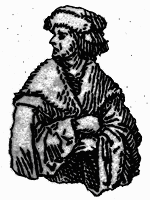
In Praise of Folly
Of course a guy like Desiderius Erasmus has written much more, even if he had to struggle along in Latin as anybody in those days, and a lot is around right now. But I can recommend only this, having read it—and then, in Dutch. The book has not been out of print since 1560, or so they tell me. Small wonder. It's funny. It's sharp. It's witty. It's to the point. It's surprisingly up to date—don't be put off by the fact it's over four centuries old. Really reads like it's been written yesterday. You can brag about having read it and impress strangers at cocktail parties (only to disappoint them later on, but that's their problem, right?) and have fun all the time! What a deal... Read it, by all means. Very entertaining, even if it was dedicated to Thomas More, whom Solzhenitsyn blamed for inventing forced labor camps in his Utopia; which is true enough.
Look, there is more by Erasmus in print right now, in 2003, than of Ernie Gann... Mark Twain... Robert Louis Stevenson... Jan de Hartog. What are we talking about?
If you have been looking via search engines for the plot of this book — there's no such thing. It's more like a modern newspaper column, if anything.
There is a street named "Erasmus" in Willemstad, Curaçao—but that's not Desiderius but Jan Erasmus, privateer (kaapvaarder). Ah well.
C.S. FORESTER
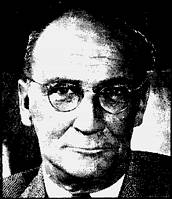
Beat to Quarters.
The first Hornblower novel Forester wrote; but there is no reason at all to read them in chronological order, following Hornblowers career. Do not confuse this guy with E.M. Forster; you'd be sadly mistaken. Forester was a wise guy: "After a World War I stint in the infantry, however, he decided to be a poet." At first sight, that surely looks better than fighting in the trenches, but thankfully he didn't. (There are only three poets I can what you'd call enjoy, which are Kästner, Wodehouse and Daan Zonderland).
Captain Hornblower seems to be the most popular character in English literature. Competing with Jeeves and some others I could mention, that's pretty good, but no big surprise either.
If you like this book, you'll surely want the following two volumes in the trilogy, Ship of the Line and Flying Colours. And once Forester has really got his hook into you, you'll want more and more. And not only from The Hornblower Saga. The man certainly has kept himself busy writing and I have made up a list (which probably is incomplete).
There is a pretty much okay 1951 Raoul Walsh movie ("exciting, well-produced"), Captain Horatio Hornblower, with Gregory Peck and Virginia Mayo. More of his work has been filmed, and he wrote some screenplays and wrote the original for John Huston's The African Queen, but I never cared much for that movie. They even took out Forester's terrific anti-climax and replaced it with a standard ending. Donkey-burrows.
TOP
ERNEST K. GANN
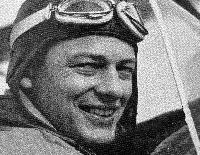
Rather a coincidence, three guys who wrote about sailing and flying (much the same thing) in a row. (You may notice I don't list Joseph Conrad. He is among my favorite authors, but such a gloomy bird! Also, as Ben Traven rightly remarks in The Death Ship, he's always writing about noblemen, ship's officers and such, while the crew is mere scum.) Ernest K. Gann was known to everybody as "Ernie". He is the writer on flying in the period from the DC2 to the DC4. The Dutch modestly have their Viruly, the French their de Saint-Exupéry, but there is no one like Gann to give you that feeling of working a flying machine. Best known are maybe The High and the Mighty and Fate is the Hunter. Flying and sailing are much the same thing, and Gann wrote on the sea and sailors as well.
It never occurred to him to try any high-brow tricks. It's all very well written, even if Gann admits he "can split an infinitive at two miles' distance".
Gann feels the DC4 is the best aircraft Douglas ever built; but the DC10 was not around at that time.
JAN DE HARTOG
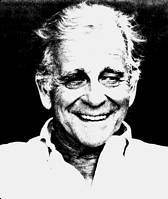
He started his career with, to my feeling, pretty crummy detective novels under the pseudonym F.R. Eckmar, freely translatable as Dr. O.P. Dead. These are still read in Holland, but as far as I know they have never been published in English; no fool, he. His novel Hollands Glorie on Dutch ocean tugs became a proud icon for the Dutch feelings against the German aggression; it's hard to estimate how many copies were printed on underground presses after the book was banned. When he published his next book The Spiral Road he discovered that the readers only wanted more of Hollands Glorie like stuff, and he turned to writing and living in English. Click on his picture to find out more about him.
A word here on the Dutch in World War II. Even the Dutch army felt that the way it had fought the Germans during the Blitzkrieg was a disgrace; and the Dutch still often loath and ridicule their army. That may be all to the good, but the sober fact is that, except for Russia, Nederland was the only continental European country the Germans did not simply overrun. The Dutch, following their war plan, flooded the center part of the country where the German Panzer divisions bogged down. There was heavy and courageous fighting as well.
"On the Northern flank the Dutch Army has shown itself capable of a stronger resistance than had been supposed. For political and military reasons, this resistance must be broken quickly. It is the task of the Army, by moving strong forces from the south in conjunction with an attack against the Eastern front, to bring about the speedy fall of Fortress Holland." (Hitler's Weisung War Directive 11, 14 May 1940).Only after the Germans bombed Rotterdam and threatened to follow up with other cities, the Dutch capitulated.
Meanwhile, they had won time to send most of their tugs and river barges to England over a North Sea that happened to be exceptionally smooth in those few days. KLM planes had also fled, and so had the Dutch royal family.
The Dutch tugs and planes were used for most dangerous jobs, like the infamous Lisboa-London flight where one of KLM's most famous pilots disappeared and chief pilot Parmentier narrowly escaped an attack by six Junkers. The tugs and barges were used in the English coastal trade, for which they were ill designed, and other hairy missions. It is the last subject, the Murmansk convoys, that Jan de Hartog wrote his maybe best book, The Captain, about.
Jan de Hartog, never a fanatic, was a Quaker and, thus, a pacifist. A lot of his work has been filmed. His work is only marred by a steadily growing superstition, but don't let that detain you from checking him out.
ERICH KÄSTNER
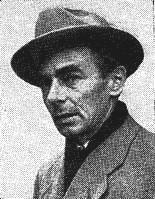
Learn German so you can read the man!
One of the greatest compliments I've ever had was when my daughter told me I resembled Erich Kästner quite a bit. (But what did she know, she was about 8 years old). Like George Orwell, Erich feels like a brother to me. I have so much to tell about this character, you'd better click on his portrait.
Kästner was the one non-Nazi top German writer who stuck it out there, even though his books were burned and he was in real danger. One result of this is he's just about the only reliable source of what it was like to be living there. Another result is that English readers only know those who got out (and consequently got the Nobel prize). Who was it who said that those who do not learn from history are punished by repeating the same mistakes? Alas, the mindless majority will not learn from history and those who do are forced to relive it along with the rest.
Diary 1945
About the final months of World War II; it would correct a lot of things you now have entirely the wrong idea about. Historians should read this and Kästners other books, instead of writing up what the Allied propaganda had to say. UFA, the national film production company, was a Nazi-run propaganda outfit? Not so. The Crystal Night was caused by a mob incited by Nazi speeches? Not so. It goes on and on. Try to get this, it's an eye-opener.
Naturally, it's out of print and I was lucky to get one of the two remaining copies, in German, from Barnes and Noble. There are a lot of differences with the Dutch translation in it. Has it even been translated into English? Talk about oversights.
Emil and the Detectives. You may know this one; it's quite famous. While Hitler was burning Kästner's books, Walt Disney of all people was filming them! Emil und die Detektive has been filmed several times; the first time in Germany with a script written by Kästner, Emmerich Pressburger and Billy Wilder (whose names may be vaguely known to you). A nice unpretentious children's (hah!) book with lots of good clean fun.
AKIRA KUROSAWA
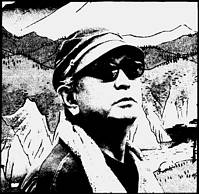
The Films of AKIRA KUROSAWA
Donald Richie
The standard work on il Tenno. Donald Richie has been living in Japan since way back when and is the recognized expert on all films Japanese; unavoidably his main interest would be Kurosawa. Descriptions and criticisms of all his movies, covering the period of 1943-1993. Also contains a filmography; a list of Kurosawa scripts filmed by other directors; unfilmed scripts; bibliography; and many, many stills. This is the first book I would and, matter of fact, did buy (the 1965 first edition).
Something Like an Autobiography.
Akira Kurosawa
Highly recommended. This will show you Kurosawa was just a regular beer-drinking guy and much less pretentious than your run-of-the-mill movie critic. It was written in 1981 but stops with Rashomon (1950). A pity, because the, to me, most interesting part of his career (with a Hollywood interlude and return to Japan via the Soviet Union) is not covered. And, after all, Rashomon was "only" #11 of 30 movies.
SEVEN SAMURAI and Other Screenplays
Akira Kurosawa
Translation and introduction by Donald Richie. Apart from Seven Samurai contains Ikiru (Doomed) and Throne of Blood (doing Hamlet one better; that's not so easy. At all).
Interesting enough. Still, what I never like about these so-called screenplays is that they are not that at all. It's just a description of the movie complete with dialogues, which leaves you in the dark about what scenes ended up on the cutting-room floor or were changed in the process. Not to mention set and camera details, and all those are exactly what we'd really like to learn about... After all, these days you buy a DVD and there you are.
YAYOI KUSAMA
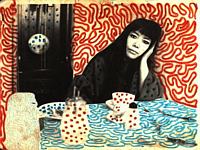
Yayoi Kusama, Lynn Zelevansky, Laura Hoptman, Akira Tatehata (March 1988)
The catalog of the great Kusama exposition In Los Angeles, New York, Tokyo and maybe elsewhere. There's a picture of mine ruined beyond all hope by Yayoi's scribbling all over it in there (no. 40), but even the combined efforts of Yayoi Kusama and MoMAs Laura Hoptman never resulted in Tokyo sending me a copy. (I had to buy it from MoMA, too. Cheapskates, all! Except the girl in their shop who gave me a discount.) But it is a fine book with great repros.
Yayoi Kusama: The 1950's & 1960's Paintings, Sculpture, Works on Paper.
Alexandra Munroe (April 1996)
Parkett #59.
Maurizio Cattelan, Yayoi Kusama, Kara Walker
Yayoi Kusama (Contemporary Artists).
Laura Hoptman, Akira Tatehata, Udo Kulturmann, Yayoi Kusama (March 2000)
In sharp contrast to several musea I could mention, publisher Phaidon sent me a copy even though there's nothing by me in it. Nice. So is the book. Sorry, I really don't care for all these highfalutin articles on Art and will not give you an opinion on those, but the reproductions are really good. A fine selection, too.
Yayoi Kusama: a retrospective.
Yayoi Kusama
Violet Obsession: Poems.
Yayoi Kusama, Eiko et al., Hosoe (photographer) (March 1998)
Yayoi Kusama: Now/
Yayoi Kusama, Damien Hirst (July 1999)
GEORGE ORWELL
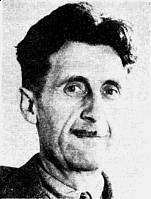
You have been brainwashed to death with 1984 and Animal Farm.
As great and necessary as they are, this one is my favorite, though. About the eternal temptation to throw in the towel, stop struggling uphill, and join the Mob in gray. Very sad, and very funny at the same time. If you have never read Orwell, this is a better start than many. If you have read him, don't miss this one.
Down and Out in Paris and London.
Next on my list. I've been there, and more than once, too. One difference, in this respect at least - there might be other ones - between Orwell and me is that, bad as things may go for him in this book, he knows there's money waiting for him at the end of the line. He and Erich Kästner are my best author friends. Both feel like brothers to me.
The Penguin Essays/
It's not only in his novels that Orwell ground a mean ax, and some of the chips fell here. I especially recommend it because I feel guilty for copyright reasons (even though George Orwell died over 50 years ago): here's a link to his 1945 essay "In Defence of P.G. Wodehouse" that should have finished all that nonsense about Wodehouse being a Nazi at once, in 1945. It didn't. Help with one more little push, right?
P.G. WODEHOUSE
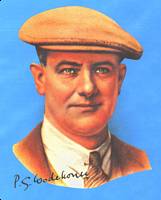
No matter what, he is the funniest writer you could hope to read. The books make such a fresh impression that it's often hard to believe that the man started writing more than a century ago. In the Wrykyn school novels, the doctor still uses a dog cart - and leeches!
The lack of superstition is a welcome change, too. There is some occasional talk about phrenology and a doubtful brand of osteopathy (both much more accepted 'sciences' at the time he wrote), but... wait. Better start from the beginning. Wodehouse's stepdaughter died at an early age. When Wodehouse died, among his books some 90 spiritualist works were found; it seems obvious he looked for a way to get in touch with her. However, he never bored you with that nonsense—in fact, in Ring for Jeeves he turns out to be a complete skeptic.
It's impossible to discuss Wodehouse without mentioning his alleged Nazi sympathies.
I never felt a man like him could possibly have had those. This is based on what Jeeves would call "the psychology of the individual." George Orwell agrees with me there, but he didn't know half the story. Like many, but not me, Orwell considers Wodehouse "politically naive".
In A Man Called Intrepid, the Secret War 1939-1945 (William Stevenson, 1976) suddenly this sentence pops up: "P.G. Wodehouse was in Nazi hands and pretending to collaborate." That's all. The so-called Nazi never even got a decent chance to defend himself. The best some people could come up with was that he, in his "political naïvity", did not understand what valuable propaganda his radio talks from Germany were to the Nazis. They were not; just read them in Performing Flea and see. What may have happened is that, after the war, Wodehouse was not allowed to talk about it; almost nothing of the intelligence war was made public before 1975. In that year Wodehouse was knighted by the British Queen; the next year he died.
Somebody should try to find out more about it; even in Barry Phelps' book Wodehouse cleverly misdirects him.
According to Robert Crum in The Observer (June 17, 2002), in 1941 German barrister Michael Vermehren was asked, in Berlin, by Wodehouse to sue "that ghastly paper of Lord Beaverbrook, The Express" for libel, as he was being attacked in England as a traitor. Lord Beaverbrook, very chummy with that Great Statesman Winston Churchill, of course since 1924 had been used as the model for Wodehouse's Lord Tilbury, swollen head-and-tummy press magnate and publisher of the most awful schlock, among which the Daily Record. (The libel suit was naturally out of the question in wartime conditions.)
The Code of the Woosters.
This is the book you should read to get rid of any stupid ideas Wodehouse had fascist or nazi tendencies. 1939 introduction of Sir Roderick Spode, the fascist dictator. It goes without saying you'll have a jolly good time as well.
Spode became one of Bertie Wooster's arch-enemies. There were more, nearly always representatives of authority. However, most of these in later books turned out to have a good side to their characters as well, like Sir Roderick Glossop, "the eminent loony-doctor" who even turns into Wooster's friend later on. Fascist Spode remains an awful baddy up to and including his last appearance.
Author! Author! * Performing Flea
P.G. Wodehouse and Bill Townend
Very entertaining! Most interesting info on the way Wodehouse constructed his plots and built characters. Like Stevenson, Wodehouse didn't go in for character development so much; he showed characters' reactions to different situations.
Probably out of print, but Penguin used to have the British version Performing Flea, with the texts of the 4 radio transmissions Wodehouse held from Nazi Germany (where he was interned during WW-II). Many people, who obviously never read him, still think this was Nazi propaganda and even confuse him with John Amery or 'Lord Haw Haw', a 'renegade' English/American who really made Nazi propaganda on German radio. (His real name was John Amery. After the war, he was shot as a traitor in England; probably quite illegally. More on him in Famous Trials by John Mortimer.)
There was an enormous to-do in England about this, and in 1945 George Orwell wrote an article In defence of P.G. Wodehouse. Look here, Orwell is the last one to suspect of Nazi sympathies. There is more on the subject in:
P.G. WODEHOUSE: Man and Myth.
Barry Phelps
Lucky guy Phelps personally knew Wodehouse and this has resulted in a very readable and solid book. Full of references, too! With complete lists on the Theatre, Lyrics, Films, English and American first editions of P.G. Wodehouse . More important to me, the book gives more details on the so-called Nazi-propaganda by Wodehouse. Putting it in a nutshell, 'It ain't so.'
(The picture is from his dust cover, no artist credit given).
WHO'S WHO in Wodehouse.
Daniel H. Garrison
All the short story and novel titles by date (USA and English) with descriptions of all characters. And then cross-indexed.
An absolute must-have for Wodehouse maniacs. No kidding. Wish I could have accomplished that.
What I have done is base my incomplete list of Wodehouse works on it.
Love Among the Chickens.
by P.G. Wodehouse and Bill Townend
A very early book, and a very good one; has been out of print for decennia. Used copies cost you like it's a Gutenberg bible. Now there's a new edition, finally; and affordable too. Only, it has /slash marks/ to indicate italics, which Wodehouse took out later anyway.
It's the only Wodehouse work I know of that was written out of chronological order; it introduces the big schemer Ukridge (pronounce "Yewkridge") as a married man, who later appears in short stories having troubles with girls, creditors and aunts.

 |
 |
 |
 |
 |
 |
What's with those *&%$#@ Flags?











SEARCH this site or the Web

copyright notice
all material on this site, except where noted
copyright © by , curaçao
reproduction in any form for any purpose is prohibited
without prior consent in writing